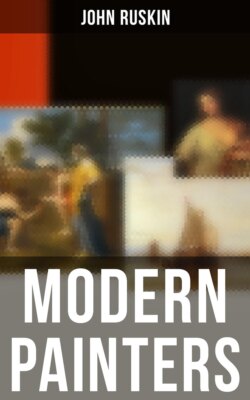Читать книгу Modern Painters - John Ruskin - Страница 21
На сайте Литреса книга снята с продажи.
CHAPTER III.
OF THE SUBLIME.
ОглавлениеTable of Contents
It may perhaps be wondered that in the division we have made of our subject, we have taken no notice of the sublime in art, and that in our explanation of that division we have not once used the word.
§ 1. Sublimity is the effect upon the mind of anything above it.
The fact is, that sublimity is not a specific term—not a term descriptive of the effect of a particular class of ideas. Anything which elevates the mind is sublime, and elevation of mind is produced by the contemplation of greatness of any kind; but chiefly, of course, by the greatness of the noblest things. Sublimity is, therefore, only another word for the effect of greatness upon the feelings. Greatness of matter, space, power, virtue, or beauty, are thus all sublime; and there is perhaps no desirable quality of a work of art, which in its perfection is not, in some way or degree, sublime.
§ 2. Burke's theory of the nature of the sublime incorrect, and why.
I am fully prepared to allow of much ingenuity in Burke's theory of the sublime, as connected with self-preservation. There are few things so great as death; and there is perhaps nothing which banishes all littleness of thought and feeling in an equal degree with its contemplation. Everything, therefore, which in any way points to it, and, therefore, most dangers and powers over which we have little control, are in some degree sublime. But it is not the fear, observe, but the contemplation of death; not the instinctive shudder and struggle of self-preservation, but the deliberate measurement of the doom, which are really great or sublime in feeling. It is not while we shrink, but while we defy, that we receive or convey the highest conceptions of the fate. There is no sublimity in the agony of terror. Whether do we trace it most in the cry to the mountains, "fall on us," and to the hills, "cover us," or in the calmness of the prophecy—"And though after my skin worms destroy this body, § 3. Danger is sublime, but not the fear of it.yet in my flesh I shall see God?" A little reflection will easily convince any one, that so far from the feelings of self-preservation being necessary to the sublime, their greatest action is totally destructive of it; and that there are few feelings less capable of its perception than those of a coward. But the simple conception or idea of greatness of suffering or extent of destruction is sublime, whether there be any connection of that idea with ourselves or not. If we were placed beyond the reach of all peril or pain, the perception of these agencies in their influence on others would not be less sublime, not because peril or pain are sublime in their own nature, but because their contemplation, exciting § 4. The highest beauty is sublime.compassion or fortitude, elevates the mind, and renders meanness of thought impossible. Beauty is not so often felt to be sublime; because, in many kinds of purely material beauty there is some truth in Burke's assertion, that "littleness" is one of its elements. But he who has not felt that there may be beauty without littleness, and that such beauty is a source of the sublime, is yet ignorant § 5. And generally whatever elevates the mind.of the meaning of the ideal in art. I do not mean, in tracing the source of the sublime to greatness, to hamper myself with any fine-spun theory. I take the widest possible ground of investigation, that sublimity is found wherever anything elevates the mind; that is, wherever it contemplates anything above itself, and perceives it to be so. This is the simple philological signification of the word derived from sublimis; and will serve us much more easily, and be a far clearer and more evident ground of argument, than any mere metaphysical or more limited definition, while the proof of its justness will be naturally developed by its application to the different branches of art.
§ 6. The former division of the subject is therefore sufficient.
As, therefore, the sublime is not distinct from what is beautiful, nor from other sources of pleasure in art, but is only a particular mode and manifestation of them, my subject will divide itself into the investigation of ideas of truth, beauty, and relation; and to each of these classes of ideas I destine a separate part of the work. The investigation of ideas of truth will enable us to determine the relative rank of artists as followers and historians of nature.
That of ideas of beauty will lead us to compare them in their attainment, first of what is agreeable in technical matters, then in color and composition, finally and chiefly, in the purity of their conceptions of the ideal.
And that of ideas of relation will lead us to compare them as originators of just thought.
